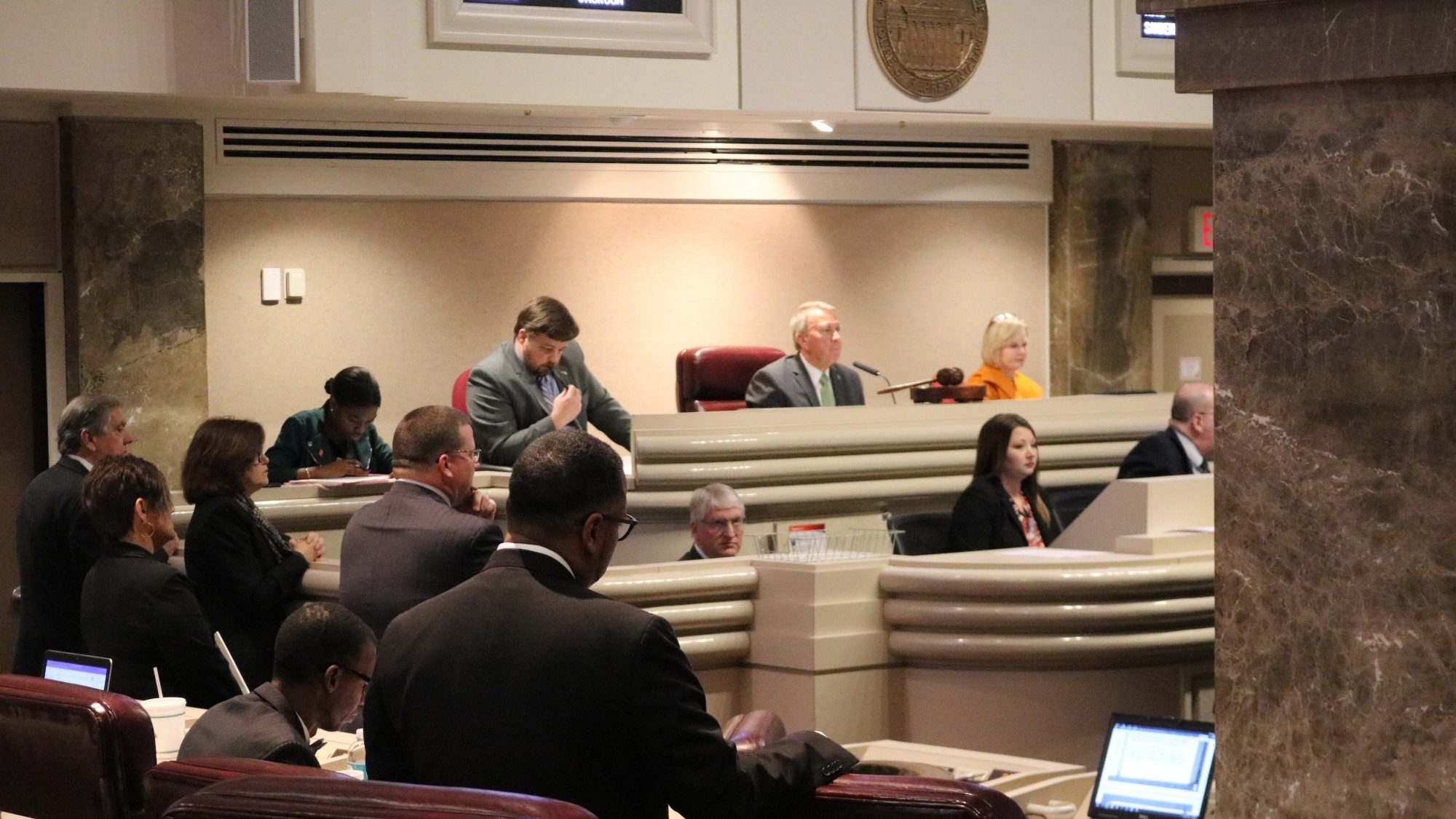The Alabama House on Wednesday, after a long day of debate, approved three bills that would allow the state to build at least two new prisons at a cost of $1.3 billion, to include $400 if federal COVID aid, but passed just one of two sentencing reform bills.
Another reform bill was killed by Republican opposition, the Republican sponsor of the bill said at the end of the day. Democrats have called for more sentencing reform as supporters of the new prisons, largely Republicans, push for construction.
The bills approved Wednesday now head to the Senate, where a vote is expected on Thursday. Among them is a bill allowing $400 million in federal American Rescue Plan Act COVID relief funds to be used to build new prisons, a use that the U.S. Department of Treasury hasn’t yet given the state clearance for.
House Bill 4 calls for the construction of three new prisons and renovations of existing facilities to be paid for through a bond issuance not to exceed $785 million, in addition to other funds to be made available in the other two bills.
House Bill 5 would allocate $400 million in federal COVID aid through the American Rescue Plan to be used towards prison construction.
House Bill 6 calls for as much as $154 million of the state’s general fund money to go toward those prison construction costs, in addition to allocating $19 million from the state’s General Fund to buy the empty Perry County Correctional Facility in Uniontown from the private prison company Geo Group, to be used by the Alabama Bureau of Pardons and Paroles to house parolees and probationers who violate the terms of their release on technical matters but didn’t commit new crimes.
Two new 4,000-bed prisons for men would be located in Escambia and Elmore counties, and a new prison for women would be located in Elmore County and would replace the Julia Tutwiler Prison for Women, but the bills don’t include separate funding for construction of the new women’s prison.
The plan calls for closing Elmore Correctional Facility, Staton Correctional Facility, Hamilton Aged & Infirmed Center, St. Clair County Correctional Facility and Tutwiler, if and when funding for a new women’s prison is secured and that construction completed.
The House Ways and Means General Fund Committee on Tuesday gave favorable reports on the three prison construction bills. The House Judiciary Committee on Tuesday approved two justice reforms bills Tuesday related to re-sentencing individuals convicted on nonviolent charges and mandatory supervision of individuals released before their end of sentence.
Alabama is being sued by the U.S. Department of Justice for alleged unconstitutional treatment of incarcerated men, including a lack of basic health care and mental health care in understaffed and deadly facilities.
In previously released reports, the Justice Department detailed systemic problems of abuse from guards, corruption, rampant drug use, violence, overcrowding and understaffing in Alabama’s prisons. The DOJ in those reports states that while new prison facilities might help in some areas, new buildings won’t fully address the state’s widespread, deadly problems in its prisons.
A rash of preventable deaths in Alabama prisons over the summer, many of which appear to be drug overdoses, highlight the DOJ’s concerns.
Rep. Thomas Jackson, D-Thomasville, said new prisons won’t solve the problems laid out in the DOJ lawsuit, and asked House Ways and Means General Fund Committee Chairman Steve Clouse, R-Ozark, how he believed the new buildings would.
Clouse said twice over a few minutes that, in addition to dealing with dilapidated, older prisons, the new prisons would help with overcrowding.
Several Democrats spoke against the proposal, and said new prisons wouldn’t address the federal government’s concerns over Alabama’s prisons.
“When we looked at what the Department of Justice Report dealt with. It basically did not talk about buildings. It talked about other issues. Am I correct on that?,” Rep. Laura Hall, D-Huntsville, asked Clouse.
“I think so, but we have to recognize the building’s cause a lot of these problems,” Clouse said, adding that new prisons “will help solve a lot of those problems with overcrowding and violence and other issues that are going on.”
Rep. Chris England, D-Tuscaloosa, later asked Clouse how the new prisons will help with overcrowding.
Clouse eventually said the new prisons won’t add bed space to the state’s prison system.
“As far as overcrowding, in the sense we’re not increasing capacity, as soon as we bring the new ones on, we’re going to take some offline,” England said of the existing prisons.
England said building new prisons won’t solve Alabama’s prison crisis and that “we need to address true criminal sentencing reform.”
“Every issue that’s been identified, every one identified, will still exist in 2025 when these first two prisons are completed,” England said. “We will still be overcrowded. We will still be understaffed. We will still be under-resourced, and if our current commissioner is somehow still working here, we will still be mismanaged,” England said.
“We owe the people who have families incarcerated more than that. We owe the people who have family members who work in these facilities more than that,” England said. “But most importantly, our responsibility is to govern this system and make sure that we’re not just spending a billion dollars to kick this can further down the road. We need to do more than just build prisons. We have to, and I think the federal court system has made that very clear.”
That 2019 DOJ report states “new facilities alone will not resolve the contributing factors to the overall unconstitutional condition of ADOC prisons, such as understaffing, culture, management deficiencies, corruption, policies, training, non-existent investigations, violence, illicit drugs, and sexual abuse.”
Hall made a motion to add $225 million to the bill to construct a new women’s prison. Clouse made a motion to table Hall’s motion, which was passed by members, tabling her motion.
Rep. Pebblin Warren, D-Tuskegee, asked how the Legislature could justify working on the state’s prison crisis while the COVID-19 crisis continues, and explained that Gov. Kay Ivey’s proclamation calling for hte special session should have included addressing Alabama’s health care system.
Rep. John Rogers, D-Birmingham, questioned spending $400 of the state’s federal American Rescue Plan fund money to build new prisons, a proposal for which he said the state hasn’t yet received clearance from the federal government.
The bill calls for Alabama to use the $400 million made available to states for lost revenue because of the pandemic, which supporters of the proposal in Montgomery say is allowed under federal guidelines.
U.S. House Judiciary Committee Chairman Jerry Nadler in a letter to Treasury Department Secretary Janet Yellen on Monday asked that Alabama not be allowed to use that federal COVID aid to build new prisons.
“Directing funding meant to protect our citizens from a pandemic to fuel mass incarceration is, in direct contravention of the intended purposes of the ARP legislation and will particularly harm communities of color who are already disproportionately impacted by over-incarceration and this public health crisis,” Nadler wrote in the letter.
Rep. Anthony Daniels, D-Huntsville, just prior to the passage of HB 4, said he had learned that some lawmakers were getting calls from constituents asking them not to pass the two sentencing reform bills. Those bills were requested by Democrats, were the product of Govl Kay Ivey’s criminal justice study group’s work and are sponsored by Rep. Jim Hill, R-Moody.
“I’m very concerned about the likelihood of any reform being done based upon the pushback that folks are receiving from back home,” Daniels said.
Clouse then spoke about HB 5, which would allocate $400 million in federal COVID aid through the American Rescue Plan to be used towards prison construction. Clouse said the Treasury’s guidelines give states “broad latitude” to use those funds, which include building new infrastructure. Clouse also mentioned the hundreds of Alabama’s incarcerated people and prison staff who contracted COVID-19.
“Do you know how many incarcerated citizens Jeff Dunn tested in the first six, seven or eight months of the pandemic?” England asked Clouse, referring to Alabama Department of Corrections commissioner Jeff Dunn.
“Less than 200, while people were dying, or couldn’t be appropriately socially distanced…Our commissioner was essentially just watching people get sick and die, even though we gave him millions of dollars to test for that, and it’s just ironic to me that we’re using this evidence of lost revenue many of unnecessary lives lost because of our negligence. That’s just so Alabama,” England said.
By the end of March, the Alabama Department of Corrections had just begun vaccinating some incarcerated people, but by then incarcerated people had been approved for vaccinations for 51 days. The department was also slow to test inside prisons.
Of the state’s approximately 22,000 inmates, just 155 had been tested for the virus as of May 29.
“I don’t think you can find the state in the country, Mississippi, maybe, or Florida or Texas, that had an awful response to the pandemic than us,” England said. “And instead of trying to figure out an appropriate way to use this revenue to protect citizens of the state of Alabama from this pandemic, we’re spending it on incarcerating people.”
England noted Alabama’s ICU beds at a point in the last surge were at a net negative of more than 180 beds, and said the money could be used to help hospitals solve that crisis, which is a desire echoed by the president of the Alabama Hospital Association, Dr. Don Williamson.
Republicans called for a cloture vote, which would limit the remaining debate on the bill to ten minutes, and the measure passed in a vote.
Rep. Merika Coleman, D-Pleasant Grove, asked who would have to pay back the $400 million if the federal government deems the money not usable to build prisons. Clouse said “Alabama.”
“But who is Alabama? The taxpayers. The tax[ayers will end up having to pay that $400 million back,” Coleman said.
After the debate ended, House members voted to approve HB 5, sending it to the Senate for final approval, and moved on to debating HB 6, which would allocate $154 million of the state’s general fund money to go toward those prison construction costs, in addition to allocating $19 million to buy the Perry County Correctional Facility in Uniontown for the Bureau of Pardons and Paroles to house people who violated the terms of their paroles.
After a shorter period of debate, Republicans called for a cloture, which passed, and after another 10 minutes of discussion members passed HB 6.
After a break of more than an hour lawmakers returned to debate two minor sentencing reform bills. House Bill 1 was introduced, which would impact certain incarcerated people sentenced before the presumptive sentencing guideline changes in 2013 by allowing them to file for re-sentencing under the current presumptive sentencing guidelines, which could result in a reduction in their sentences. The Alabama Sentencing Commission has said the bill could impact approximately 700 incarcerated people convicted of non-violent crimes.
Rep. Jim Hill, R-Moody, the sponsor of the bill, asked that it be carried over at the call of the chair, meaning it could be called back up at any point later in the special session.
Hill also sponsored House Bill 2, which would increase the number of incarcerated individuals required to be released and supervised prior to the end of their sentence. The bill makes a 2015 law retroactive for those convicted before the 2015 law was enacted. Both bills passed the House last year, but failed to pass in the Senate before the session ended.
Two amendments to HB 2 were introduced, one of which would require those released under the legislation to be monitored electronically, and the other would supply those released with a state-issued ID card. Both amendments were passed and the amended bill was passed in a 76-24 vote.
HB 1 was not called back up for consideration in the House on Wednesday. Lawmakers have said they hope to conclude the session on Friday.
Hill told reporters after the House concluded Wednesday that HB 1 was sunk by Republican opposition and he believes the bill to be dead, The Montgomery Advertiser’s Brian Lyman reported in a tweet. Hills plans to refile the bill during the 2022 regular session, Lyman reported.
The House is to reconvene at 10 a.m. on Thursday, as Senate committees work on the bills passed by the House Wednesday.


















































